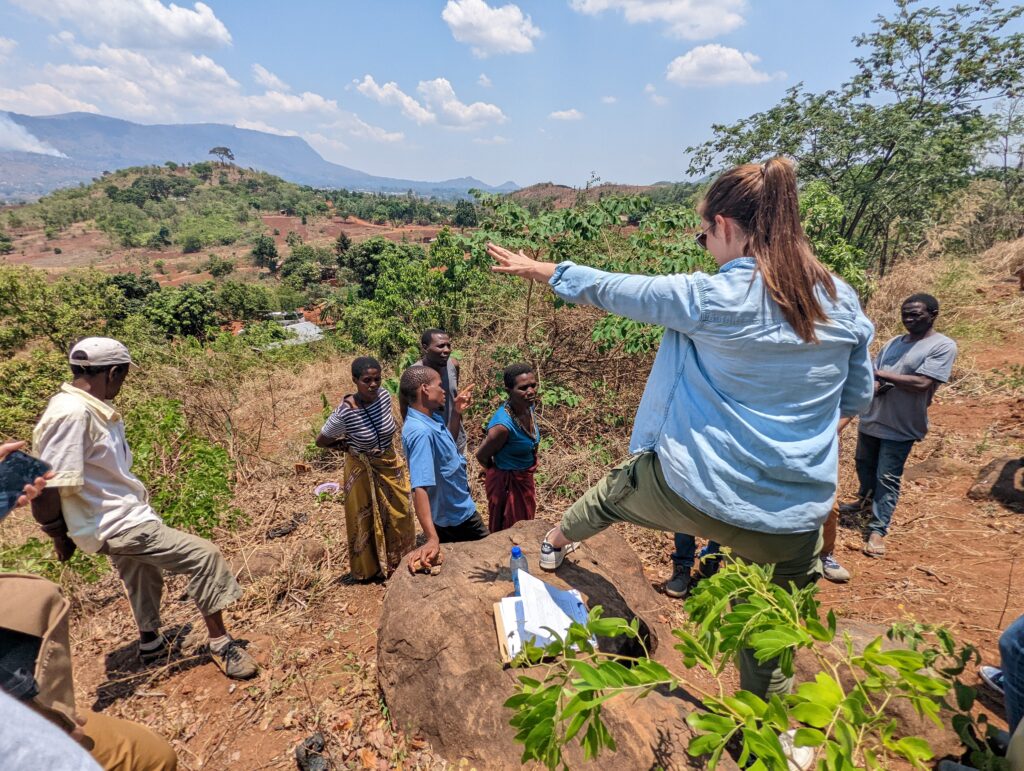A Beekeeper Goes to Malawi…

Just over two weeks ago Aidan, Atlas and I stepped off a plane in Austin that had begun 37 hours before (!!!) in Malawi, a country in southeastern Africa. (If you missed that news, you can learn more about our trip here.) I’ll be honest, I wasn’t totally sure what to expect, but my personal goals were threefold:
- See baby elephants (✔)
- See baby lion cubs (✔)
- Learn more about Malawi beekeeping and look for opportunities to share beekeeping best practices and knowledge and create ongoing relationships with beekeepers of Malawi.
#1 and #2 were the easy goals, #3 was a bit trickier, which may be surprising since teaching beekeeping is my profession. This is not my first foray into teaching beekeeping in other countries–six years ago I was invited to Morocco to do the same, so I had some past experiences and understanding of the challenges going in: language and cultural barriers, the complexities of how to prepare to provide assistance to groups of people I’ve never met and whose knowledge I cannot fully assess from a distance, and of course, wanting to avoid any semblance of the white savior complex. (On that last one: I pressed upon our group that there is MUCH to be learned from other beekeepers, no matter their skill set, particularly in a country half-way around the world. This trip was meant to provide an exchange of information, and not exist as a one way street of sharing.)
Our first stop on day three was with an organization called Emmanuel International (EI), a U.S. based aid organization who started providing humanitarian aid to the Zomba District in Malawi in 2017. The project is intended to improve the resilience of communities in response to climate related shocks (in this case, floods from 2015), and one of the objectives is to establish 14 new beekeeping clubs and support those groups with beekeeping equipment, hives, and gear. This group was added to the schedule last minute, so I was unable to prepare for the visit by meeting with the group ahead of time or even researching the mission: I literally had a one page briefer in hand and had to fly by the seat of my pants on this one. What made the visit even trickier was that I was not alone: I had 14 safari participants with me (some beekeepers, some not) and I was responsible for making sure the experience was one that was beneficial and meaningful to them as well. To say I was a bit anxious was an understatement. Preparation is a virtue in my world, and circumstances did not allow for that here.
We walked off the bus to a circle of 20 or so white plastic chairs. Before us sat three local representatives of EI and a handful of Malawi beekeepers. I greeted our hosts and took a seat, thankful that they were prepared to kick off the meet and greet with an introduction. Aubrey of EI began with background and then turned to one of the community beekeepers and asked him to begin his presentation. We watched as Kawo, one of the beneficiary community beekeepers, stood. With incredible detail and a chest visibly full of extreme pride, Kawo presented to the following to us for each year since 2017: total funds received, number of hives managed, number of pounds of honey harvested, revenue generated, how much money the beekeepers paid themselves, and how much money they invested back into the business for each year since 2017. He sat, and the room looked at me. It was clearly ‘our turn’. Again, my stomach dropped as I felt totally unprepared for what should happen next. Our time was limited and I had no idea what the expectations were…
“I’d love to know more about where your greatest challenges lie.”

One simple question, set off a flurry of exchanges back and forth (or as quickly as one can “flurry” when having to work through a third-party translator.) We quickly learned that the group was looking for ways to increase their honey yield, and were struggling with ways to increase revenue with such limited supply.
BOOM. At Two Hives we too struggle with ways to support additional revenue with very limited honey supply! Here was an experience sharing waiting to happen. (A side note: advice is so incredibly worthless as a tool for helping others. You know what’s really helpful? Sharing a time when you had a similar experience and what did/did not work for you. Think about that next time you are preparing to give advice: try reframing what you are about to say. Instead of “you should” try “I’ve found what works for me is…).
I shared ways that we try to increase our yield and provided ideas of how that may translate for them. Once we learned that they have simply been disposing of their beeswax, I shared that a critical part of our business model has been finding other ways to create products from the hive, including using propolis, beeswax, and even selling equipment and gear to other beekeepers. The beekeepers asked more about how we service other beekeepers, and I explained that we sell everything from hive equipment to bees. As we explained how we can take one strong colony and create two colonies, either to sell to another or to increase our own apiary size, a seismic shift happened in the group, on both sides. After Aubrey translated the message, you could see a wave of awe and mouths drop open as the beekeepers realized what we were saying. They did not realize that you can use a technique called “making splits” to increase colonies in your apiary. This is a critical aspect to being a successful beekeeper.
As I watched their minds being blown, I looked over at the American side of the circle. This was a moment. I could see the power of this trip dawning on the faces of our group. In that moment they grasped the power of knowledge, and what we could do with it. How an exchange of ideas and information can literally change lives. Yes, we brought the group equipment. But what we did in an hour on that day sitting in a circle of plastic white chairs was so much more than equipment or money. It was access to knowledge that is currently unavailable to the group. This group who are working as beekeepers to try to pay for their kids to go to primary school. Later Aidan described the moment like this: “You were so in your element. You saw an opportunity to share real life experiences, and you couldn’t have been more excited about it. Five minutes in I thought: well, this is NOT the last time Atlas will be traveling to Malawi….”
What started that day as a shaky meeting full of unsure anxiety for me, kicked off 11 days of some of the world’s most jaw-dropping wildlife, lessons in gratitude and service, and meeting some of the most joyful people I have ever met. Like with any big trip, it wasn’t without it’s bumps in the road. But that’s not what we will remember. We will remember the people that opened their doors (and arms) to us, perfect strangers, time and again. We were serenaded with songs and dancing so many times I lost count. Yes, I wanted to go to Malawi to help beekeepers, but the people of Malawi gave us so much more. Children and adults alike chipped in to help care for Atlas, dancing with him, feeding him, even tying him to their backs (what a great mom hack!) I have so many stories to share, I don’t have the space for them all. But I want you to know two things:
- Thanks in part to your generosity in response to my last email, we delivered more than $800 of beekeeping equipment, gear and tools to beekeepers of Malawi.
- It’s not over. We are doing it again next year, building on the relationships and knowledge we gained. I’ve already had two follow up calls with the beekeepers of EI and we will continue this relationship building up until our next trip. We will be better prepared to make an even bigger impact in 2023 (and I will be way more equipped to share a packing list with you!) Interested? Fill out this form and mark your calendars for the first two weeks in November. More info coming soon.
Til then, as always,
For the bees,
Tara Dawn
All photos by the incredible Adrienne Dawson, who was the unofficial photog of our trip.



Yes I’m interested in Malawi 2023
HI Sheri! yay! Heres a form to fill out –we will be in touch with more details soon. save the first two weeks of November on your calendar!
https://forms.gle/TGRsrcpX9pnraCaDA
Also what was the cost of the 2022 trip?
We expect the trip this year to be roughly $4-4.5k which includes all costs except for airfare, beverages, and tips.
I’m interested.
Hi Nancy! We would LOVE to have you–that would be so fun. Heres a form to fill out and we will be in touch soon!! https://forms.gle/TGRsrcpX9pnraCaDA